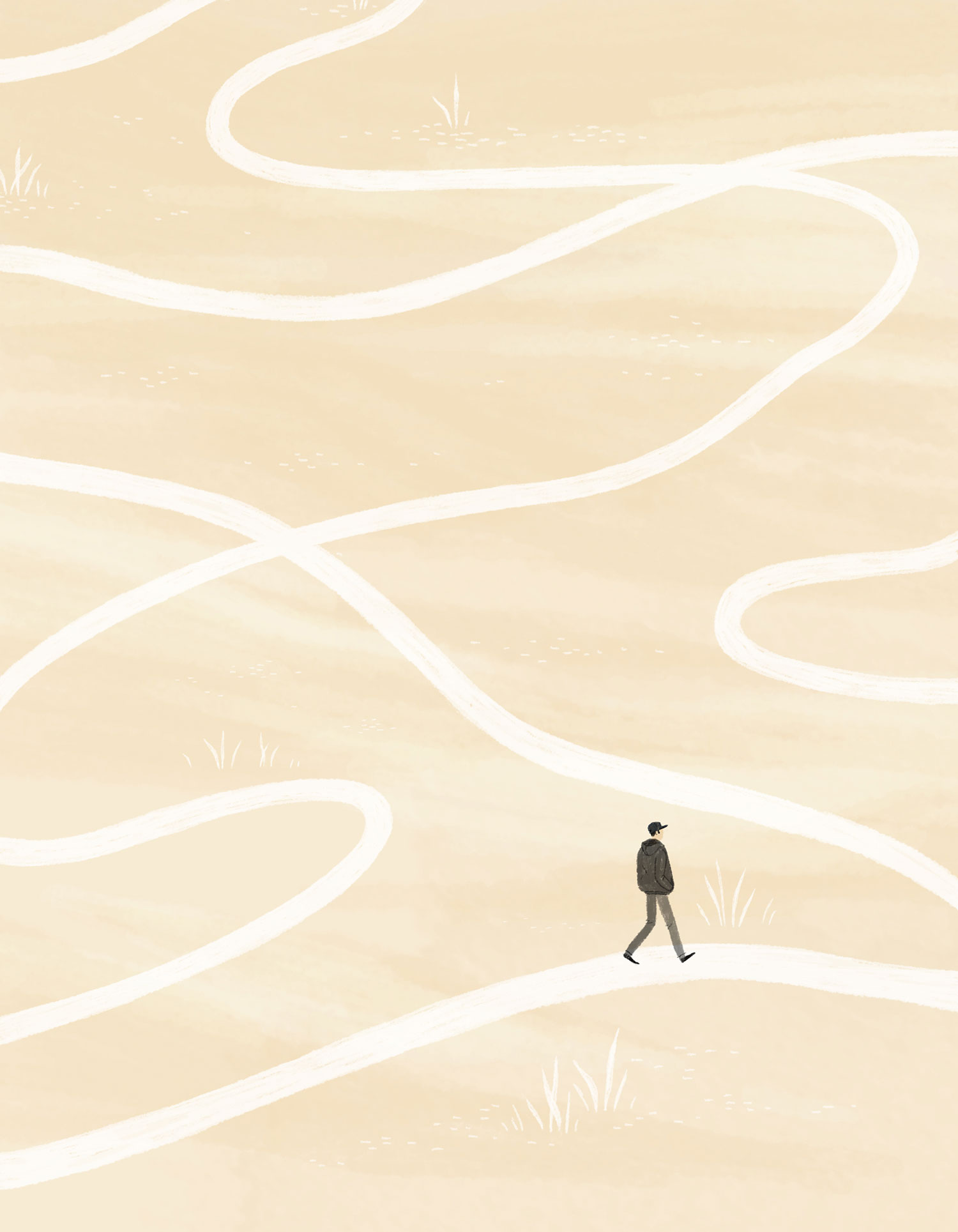
Before he became a hip-hop artist, there was Jason Chu the Yale University student, and later, Jason Chu the young adult ministry intern at Beijing International Christian Fellowship.
I heard a word of prophecy, to drop a poem on top a beat
And trust that all these words could change the world ...
— THE UNCOOL
I was on stage. In Beijing. In front of about 400 young Chinese kids.
It was June 10, 2011, and the city's swampy mixture of pollution, dust, and air had me sweating through my tank top at Tango, the mega-club next door to Jin Ding Xuan — Beijing's three-story, 24-hour dim sum spot — and the 481-year-old Temple of Earth.
Tango's four neon-drenched floors were home to the city's burgeoning dance music scene, a karaoke club, and — on that particular night — the launch party for Sbazzo's new album, "The Light".
Sbazzo, a Chinese Canadian guy who had come to Beijing to study Chinese and inadvertently kick-started the country's hip-hop scene, was arguably the country's No. 1 rapper. For his album release show, his team had Tango packed out with a mob of friends and fans. In the artist holding rooms behind me, China's hip-hop pioneers — rappers, DJ's, breakdancers, and skaters — lounged and drank. In the audience pit in front of me, hundreds of young Chinese kids were performing the time-honored rituals of the rap audience: milling around, waving their arms, shouting back choruses, and spilling drinks on white Nike Air Force 1s.

Like youth everywhere, those Beijing hip-hop heads were carefully attentive to the broad movements of international culture; looking up at the balcony, I spotted LRG, Adidas, and BAPE tees. In 2011, baggy jeans and cargo shorts were still fashionable — or at least, adjacent to it — and the audience draped theirs loosely over Jordans and Air Max 90s.
To my left, red and purple lights strobed across James, a graffiti artist/model/designer in the same Beijing rap crew as me. He was waving a T-shirt with our logo around his head like a flag, his long hair flying as he jumped up and down, tracks of sweat streaming down his face. On my part, I was bouncing from stage left to stage right, sweating on kids, and yelling at them in terrifically broken Americanized Mandarin as they screamed back at me an indecipherable mixture of English, Chinese, and cursing.
Did I mention I was in Beijing to work for a church?
Let's rewind, and start at the beginning.
Throw the shackles off your back, pack a bag, grab a map
Find your voice, let it breathe, and you can live — free.
— Free
In 2005, as a sophomore at Yale University, I made a decision that changed the course of my life: to study Mandarin Chinese.
During our freshman year, my boy Scott Cohen had taken Mandarin; the following summer, Yale had rewarded him with an all-expenses-paid trip to Beijing. In fact, any student enrolled in an Asian language class could get a three-month trip to East Asia, courtesy of the Richard U. Light Fellowship, with spending money, transportation, and tuition included. All it cost was the low, low price of a few thousand words describing "how further East Asian language study in a full-immersion environment will enrich your course of study and future career".
I knew a good thing when I saw it, and the one Chinese cultural trait that my immigrant parents had actively bequeathed to me was a deep love for a free ride.
There was only one hurdle in my pursuit of learning Chinese: learning Chinese.
I never spoke Chinese — still we communicate
My favorite dumplings, and the buns with sesame
— Grandma's Kitchen
As an Asian American kid growing up in Delaware, I'd never been close to my Chinese roots. My dad, mom, sister, and I all spoke English at home. Mom made meatloaf and baked bread. I learned how to use chopsticks from a wrapper at The Crownery Chinese Restaurant. I almost got into a fight my freshman year in high school when another Chinese kid called me a "banana": yellow on the outside, white on the inside.
The year before my parents started home-schooling me, I attended a little Christian school for kindergarten. There, I had my first crush ever: Jennifer, a white girl with freckles, who wore her brown hair in springy bangs over her blue eyes. When I turned 10, I had a Civil War reenactment for my birthday. For my 13th birthday, my parents threw a party at the fun center near my house, and invited all of my best friends, the majority of whom were white.
The closest we came to Asia was stepping foot in our grandparents' apartment in Bethesda, a retiree-heavy suburb of Washington, D.C. a couple of hours away from our house in northern Delaware. My sister and I loved everything about our visits there, from Grandma's well-stocked kitchen and the endless variety of nearby Chinese buffets, to the exotic-to-us Asian grocery stores pungent with dried prunes, live seafood, and all the spices that Mom would never use or keep around the house. After big family dinners with aunts, uncles, and cousins, we'd roll off onto the staticky carpet. We'd play with toys bought that afternoon from the Montgomery Mall, just across the street from Grandma's building, or watch TV while the grown-ups sat around the dining table playing cards and chattering in Cantonese, Mandarin, and Thai.
Grandma was always so proud of us; her fridge, vanity, and every other available surface was crammed with pictures of babies, award ceremonies, and previous get-togethers. But as much as our faces, family name, and blood drew us together, that high wall of language always held hostage her pride and love. Conversations with Grandma were slow and shallow, never dipping below the surface. When we visited, she'd interview us in her tentative English, writing out notes to herself in Chinese about our progress in school ("You do good, get good grades?"), interests ("What you like study?", "You like play what?"), and favorite toys ("How do you spell it — L-E-G-O?").
At school, after the holidays — Thanksgiving, Christmas, Easter — my friends would talk about the time spent with their grandparents, and the stories that they had shared with them: "the War", their marriages, distant ancestors, and their youth in a world now long since passed away.
We never had that.
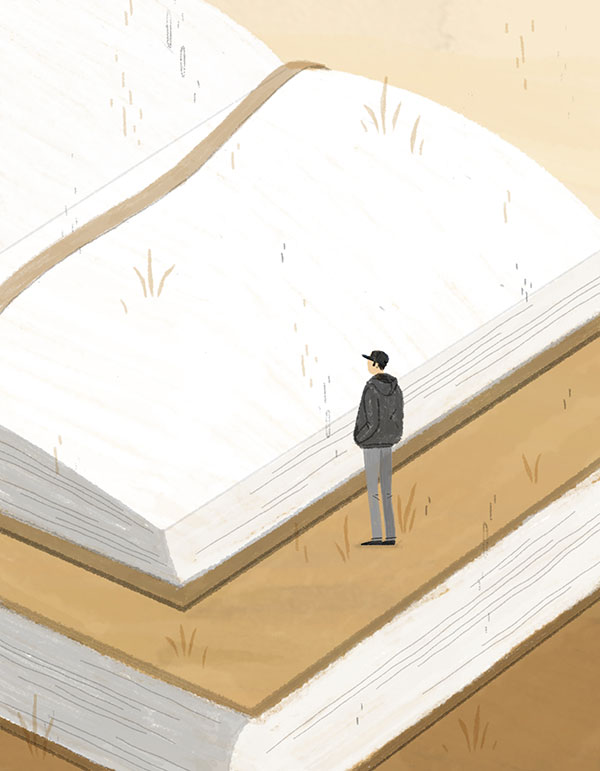
I don't tell "the Asian American story".
I tell our. American. Stories.
— SPEAK
In 2005, when I made the decision to study Chinese instead of the other 50-plus offerings in Yale's foreign language department, I didn't make the connection to these half-touched stories. I lacked the personal awareness to draw the ties between my emotional frustration, fragmented identity, and family history.
But now, surveying the terrain of my life from the vantage point of 2016, I see that decision as a tentative offering at the foot of an altar I'd only barely glimpsed during those nights in Grandma's kitchen, those dinners at American Chinese restaurants, the middle school karate and kung fu classes. It was a small but decisive step that guided me forward into a path of sharing and loving my own story.
But before I could tell that story — I had to first live it.
I did plenty of living in that year of Intro Chinese 115. I was an outsider, a child of foreign lands banging my head against the Great Walls of pronunciation and Chinese characters. But something in me clung stubbornly to the path — and so I found myself, the summer after sophomore year, on a plane descending into Beijing, which deposited me on a bus bound for the Duke in China program at Capital Normal University.
A week into our summer, Billy Meyers, a cool junior from Duke University, came up to me and said he was going to hold a Bible study in his room — a weekly ritual that became a place of calm, familial warmth in the midst of navigating a new city drenched in a language and culture I'd only sipped of in Chinese classes at Yale.
At Capital Normal, Chinese 115 gave way to second year Chinese taught by Wang laoshi, Dai laoshi, and Nie laoshi — friendly, pretty, young Chinese grad students only a few years our senior. After a few trips, mutual friendships were struck between us all; and by midsummer, it wasn't a surprise to see an instructor or two joining our little midweek Bible meetings.
Beyond this oasis of fellowship, I found another spiritual pastime in Beijing: spending sweet Light Fellowship cash in bootleg markets filled with BAPE jeans and Nike Air Maxes. One such evening, I was out in an underground market in the middle of the city, not far from Tiananmen Square, when I heard a heavy accent yell out, "Oh man, where you get that shirt?"
This was how I met Ouzi: rapper, Japanese clothing expert, and fashion designer. After a couple of times hanging at his store, playing bootlegs of the new Young Jeezy, Kanye, and Game albums, I started crashing at his apartment on the weekends: writing raps as we watched bootleg DVDs, drinking Tsingtaos on the street, and buying limited edition Nikes in big garbage bags straight from the factory floor.
I didn't know it at the time, but those 13 weeks in Beijing would change the rest of my life.
That Bible study led me to getting more involved in my Asian American church back on campus, and a junior year of beginning to see God as an answer to the long nights of depression and years of inadequacy that I'd been feeling ever since high school. It led to Billy moving back to Beijing after graduating from Duke, and dating Jingyi — formerly known to us as Wang laoshi.
It led to a long junior year of biking bleary-eyed to 9 a.m. Mandarin classes, earning me another ticket back to Beijing, where I spent another summer hanging with Ouzi and the rest of our Beijing rap/fashion/Tsingtao-drinking crew.
And it led to my senior year decision: to return to campus after graduation and serve in campus ministry at our church. At the same time, half a world away, Billy and a handful of his young, international Christian friends found a young adults ministry at Beijing International Christian Fellowship, a ministry that would become a crucial part of my future.
May your storms bring rainbows
And your trials make you thankful.
— Sufyan (Ryan's Son)
By 2009, I was still living at Yale. No longer a student, I was now a "campus ministry fellow" for United Church of Westville, the little Asian American student church that had nurtured me out of isolation and into community. I was spending my days eating lunch with students, talking with them about life, Jesus, and hope, and learning to write sermons.
On September 9th, I was sitting at my desk when Billy messaged me from Beijing, saying that The Embassy — the young adults group at BICF — was starting to talk about finding a full-time staffer. The ministry had grown rapidly over two short years, from a handful of young men and women to a whole community of young professionals and college students in their early-to-late 20s. Would I, with my love for Beijing, and with young professionals and college students, be interested in being that staff member?
Half a year later, after rapid consultations with mentors, fundraising trips, and storing my worldly possessions back in Delaware, I bought a one-way ticket for Beijing. In the course of a single week in June 2010, I flew to China, was Billy's groomsman as he married Jingyi, hung out with Ouzi at an all-night rap concert, got wracked by a ridiculous case of food poisoning, and started my new job as the young adult ministry intern at BICF.
I got a fire rising higher, lighted under my rear end
— THE UNCOOL
By 2011, my ministry at BICF was going great: the young adults ministry was growing steadily, and my college ministry was flourishing on Friday nights. Thanks to local rap homies like Ouzi and Sbazzo, I was also a regular in the Beijing hip-hop scene — a revolving door of big personalities that skate, DJ, sell weed, and throw monthly parties for Chinese kids hungry for a side of Beijing culture that the state-approved pop stars and radio stations never go near.
I never could have foreseen how my hip-hop night life would bring the end to my Christian world as I knew it.
Since high school, rap had been a fun thing, a side hobby purely for my own enjoyment. I had no purpose larger than the immediate: blowing off steam, venting my frustrations, and balancing out the academic/ministry grind that would otherwise rule my schedule. Rehearsing new songs that we'd just written to beats played off his computer, Ouzi would often ask me to explain my English lyrics to him. I rarely could; they were always inane, inside jokes from me to myself, clever and meaningless all at once. "It's just jokes," I'd tell him. "Just fun, man. Nothing serious."
I moved to Beijing because I knew from experience that it was filled with lonely people looking for friends and community. I thought I'd help those people by facilitating Bible studies and prayer groups, speaking at and helping run Thursday and Friday night large groups, organizing community groups, and being a part of a small group.
But the funny thing was, as I did so at BICF during the day, I was discovering at night that my casual rap sessions had the potential to be more than just jokes. I loved how our church's Bible studies and large group sessions made a home for young lonely kids looking for rest and growth. But the place I most felt that connection was on stage. Music blaring, with wide-eyed Chinese kids in Levi's 501s and Jordan IIIs, holding beers and yelling back at me — I performed, spoke, moved with conviction. Caught up in the moment, freed from the need to force everything into a structure of theological reflection or philosophical musing, I felt free.
In those clubs, songs, and conversations, I heard God speak.
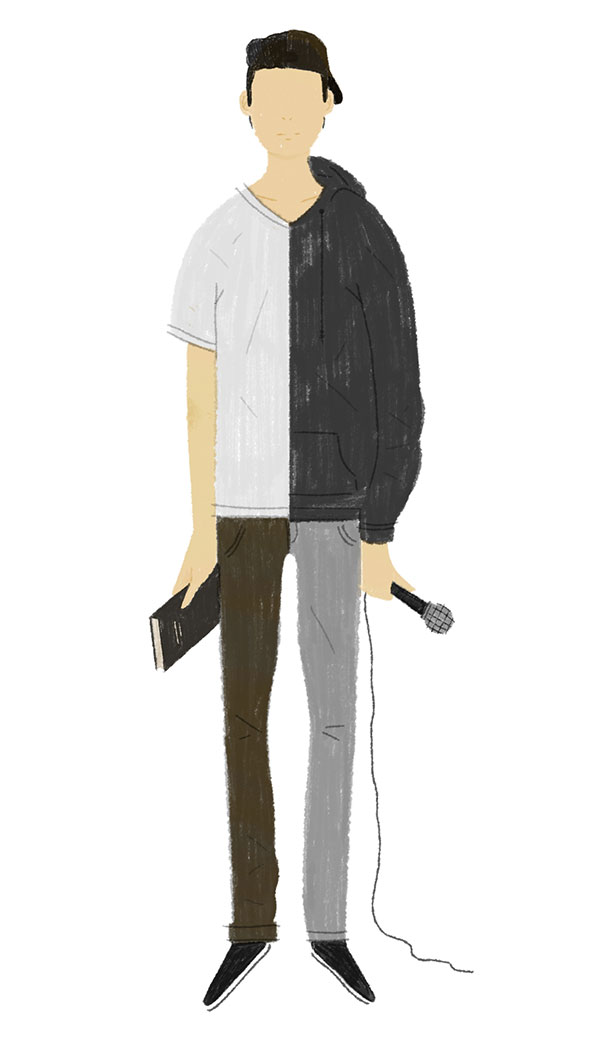
It's been tumultuous years, if we're really keepin' it real
Pastor Karen assures me, that's the first step to be healed
— Holding On (Intro)
My whole life, my dad had been a research chemist; I'd followed his example, entering — and winning — science fairs and competitions. My grades and research had led to winning academic contests that covered most of my college expenses. When I heard people say things like "art is the language of the heart", I'd always written it off as overly sentimental. Music was fun; but I knew that what was really important was good teaching and solid theology. Art was secondary. Sensual. Fleshly. Unimportant.
But at some point in 2011, probably shortly before that performance at Tango, music began to take on a new and unexpected role. The music was changing me; and the music I made was beginning to change.
I went from playing a rapper, to being one. My lyrics began to reflect my life, thoughts, and background, rather than simply mimicking the words and phrasings of my heroes — Black men from New York and Compton, white men from Detroit and Brooklyn. When I was emotionally exhausted, worn down by the stress of living in a foreign culture whose concept of "personal space" was distinctly not my own, music became my place of refuge. I began to let go of the need to look and sound "good", and instead focus on being real. True. Unfiltered.
My songs went from abstract, jokey, unfocused, to naming my specific hopes, inspirations, and friends. At the same time, my Thursday and Friday night messages started to become less analytical, and instead took on a personal, passionate, convicted energy.
Whenever I stood in front of an audience, whether in the thick air of an underground rap club or the bright neon of BICF Chapel B, I started to ask myself, "How is this going to serve these people? Can I somehow help them feel loved, yearn for grace, burn for justice?" instead of "Is this going to make them think I'm clever?"
I'd studied, audited classes on, and learned about hermeneutics — the science of interpreting the Bible. But it was only as I learned to rap, that I learned how to preach. When I stopped writing sermons as intellectual exercises, and started writing and researching them like songs, I began to understand: Sermons aren't academic papers, whose goals are to discover and detail a novel concept. Sermons are written to guide people toward the goodness, hope, and beauty of God's love.
The music was doing something in me, and it was doing something around me. The more I rapped, the more I realized that the ministry that drew me to Beijing was taking place in the crowds at my shows. Chinese kids would add me on Kai Xin Wang, one of the rare social media sites still uncensored by the government; we had hour-long conversations about the inspiration behind my music, my life in America, my beliefs, and my work at church. After shows, I talked to kids with my broken Chinese, answering their broken English, building friendships. Creating community.
Around that time, encouraged by some up-and-coming YouTuber friends, I shot a couple of quick videos in Beijing and uploaded them to YouTube, an excruciating all-night process of watching my encrypted connection slowly carry bits of video through the Great Firewall of China. But it was worth it: I started getting thousands of views, sometimes tens of thousands, with comments from around the world. My friends moved to Los Angeles and began the process of becoming professional content creators. And they told me that I should go with them.
I was proud to see them grow and excited by my newfound passion for art and expression. But I still hesitated to move to a city where I'd have two friends, no connections, and would be fighting to enter an industry where I had basically zero business experience. But they were insistent: I should at least try out L.A. with them. See what could happen if I took it seriously.
If I wanted to change the world, shouldn't I at least be willing to change my world?
Chinese kid from Delaware,
no combination of who I am is supposed to be here.
— Holding On (Intro)
In May of 2012, a little less than two years after I moved to Beijing, I bought another one-way ticket. Japan Airlines to California by way of Tokyo-Narita. The Saturday night before I left, I threw a farewell concert, "Goodbye, Beijing." — two hours in an art gallery packed with my band, my friends' bands, and over 300 of our friends in Beijing's trendy 798 arts district. The next thing I knew, it was all over, it was past midnight, and I was starving. My friend Josh threw me on the back of his motorbike, and we drove through the warm breeze of a Beijing night to join 40 of our friends at the outside tables at my favorite neighborhood spot, eating beef, fried fish, eggplant, and all the dishes that had become my comfort food over the last two years.
That Monday morning, I left my keys on the kitchen counter and walked onto the airport shuttle line at the end of my block, bound for Beijing International Airport. The trees lining the airport freeway whipped past the windows as the sun glowed behind them, softly diffused by the brown haze of the city. The rubber flaps at the end of the luggage conveyer belt flopped down to swallow my bags, containing the remains of my life in Beijing, as the stewardess handed me two thin pieces of paper, my future printed out in black and white. My backpack and I walked through the airport onto a plane bound for Tokyo, then the clear, blue warmth of a Los Angeles summer.
On June 12, 2012, I officially became a hip-hop artist based in Los Angeles, California.
On June 13, 2012, I was lying in bed in the full grip of a panic attack, realizing: I had no clue what a hip-hop artist does all day; 6,000 miles and the Pacific Ocean now separated me and my Beijing fanbase; and I had bit off way, way more than I knew how to chew.
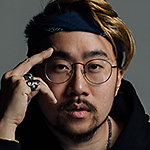
Jason Chu is a rapper on a mission to speak hope and healing in a broken world. He tells stories of a generation wrestling with fear and joy, greed and hope, hurt and healing. For more information, visit jasonchumusic.com and youtube.com/jasonchumusic.
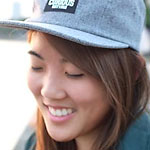
Maggie Chiang was born to a Taiwanese family in the City of Angels and is a full-time artist and part-time dreamer. Inspired by places both real and fictitious, her illustrations evoke a longing for adventure and the pursuit of the unknown, exploring impossible landscapes and places unseen. You can find her online at hellomaggiec.com.